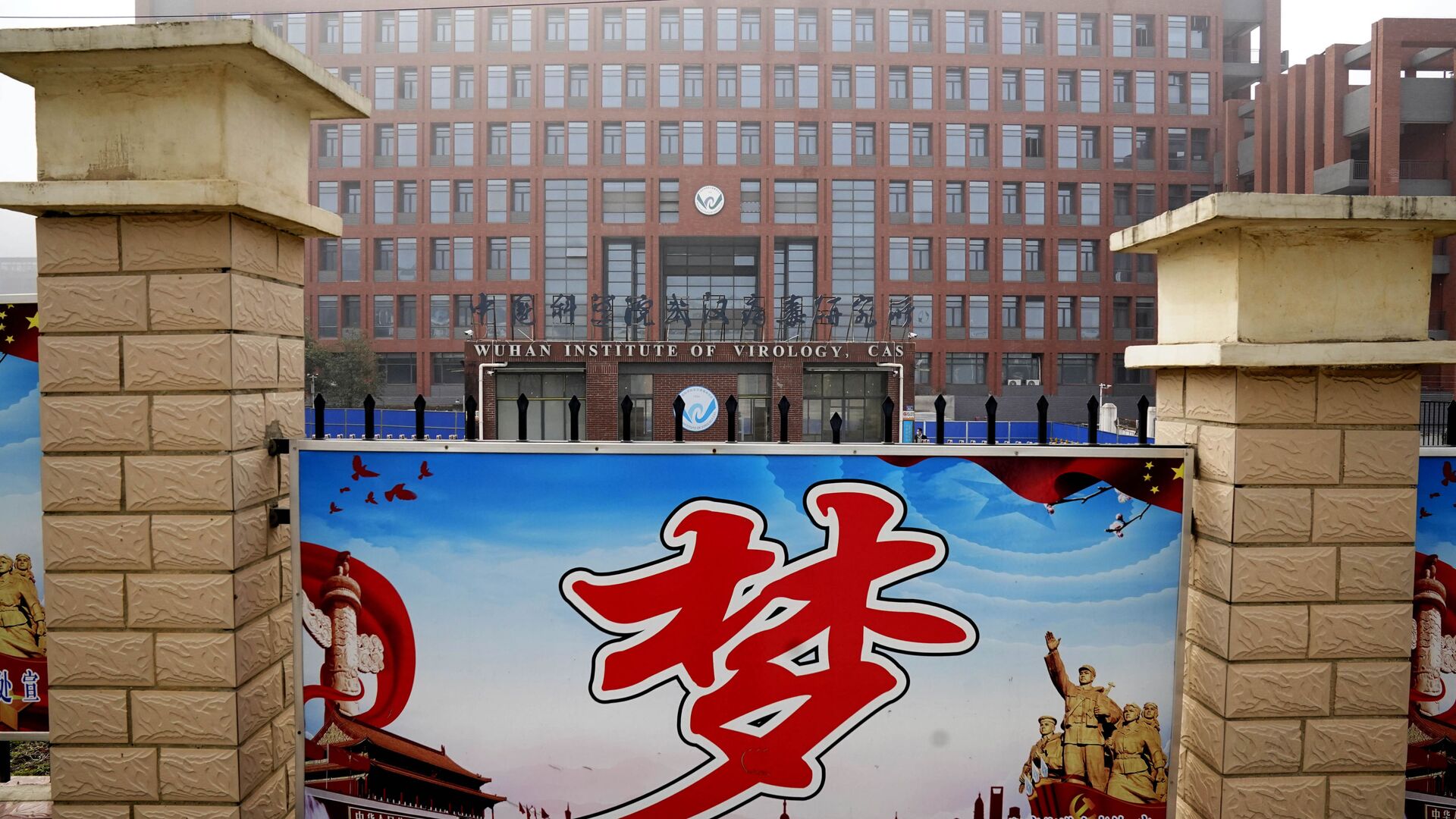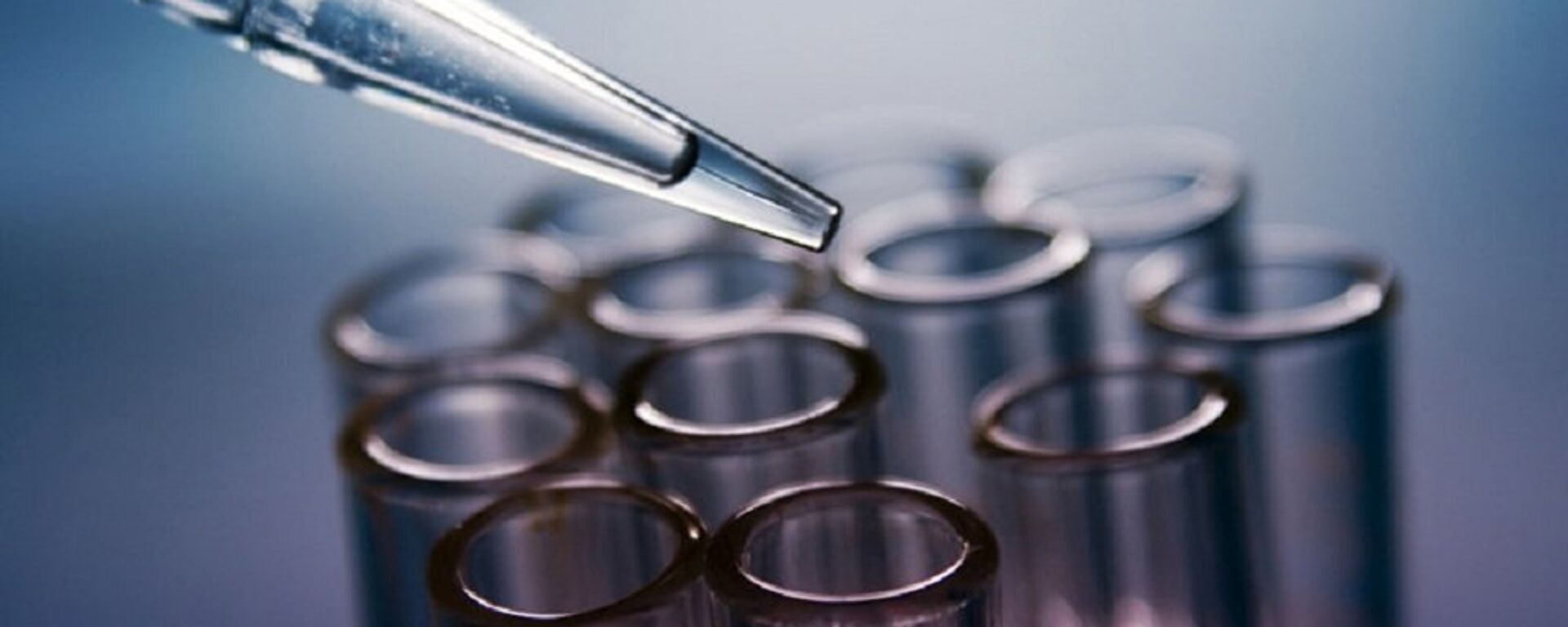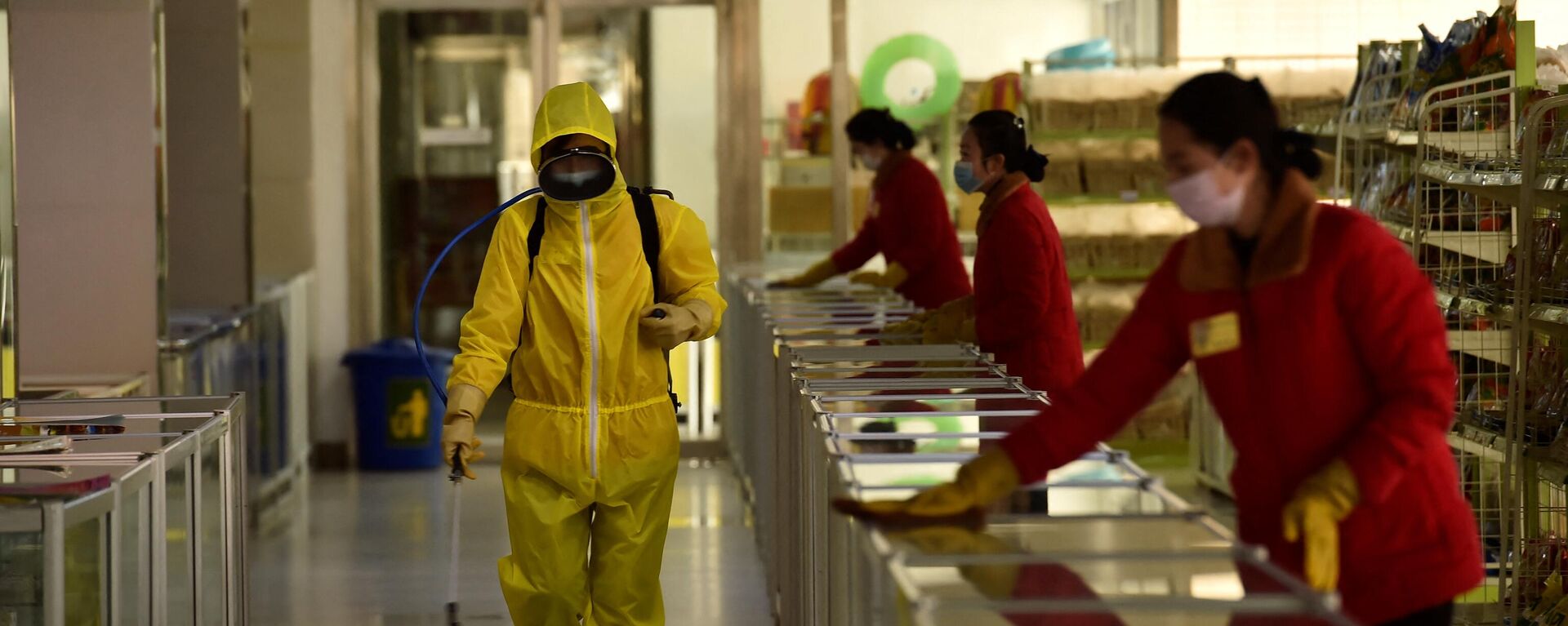https://sputnikglobe.com/20230309/ex-uk-health-secretarys-covid-memoirs-censored-by-cabinet-over-lab-leak-claims-report-1108200977.html
Ex-UK Health Secretary's Covid Memoirs Censored by Cabinet over 'Lab Leak' Claims: Report
Ex-UK Health Secretary's Covid Memoirs Censored by Cabinet over 'Lab Leak' Claims: Report
Sputnik International
UK Ex-Health Secretary Matt Hancock's 'Wuhan lab leak' memoir comments were reportedly 'censored' by the Cabinet Office.
2023-03-09T07:48+0000
2023-03-09T07:48+0000
2023-05-28T15:26+0000
world
matt hancock
china
covid-19
cabinet office
wuhan
wuhan university
united kingdom (uk)
https://cdn1.img.sputnikglobe.com/img/07e5/06/01/1083047599_0:160:3072:1888_1920x0_80_0_0_6b86d53495694a303aa90751664d544f.jpg
Britain’s former Health Secretary, Matt Hancock, was instructed by the Cabinet Office to water down his "skepticism" regarding the Wuhan wet market explanation for the origins of the COVID-19 pandemic, as the government feared it would "cause problems" with China, according to a UK media report.Over 100,000 such exchanged messages between Matt Hancock and other officials at the height of the coronavirus pandemic have been leaked to a UK media outlet.However, as the ex-health secretary followed the procedure required from all former ministers, and turned over his manuscript to the Cabinet Office for review last year, he was reportedly told by the Cabinet Office:“This is highly sensitive and would cause problems if released. Must be clearer that it is supposition rather than revealing any confidential information received from inside government. Should also be clear that this is not HMG views or beliefs.”Further along in the draft, Hancock had originally weighed in on the Wuhan "lab leak theory", purportedly writing:Furthermore, Hancock had added that, "Global fear of the Chinese must not get in the way of a full investigation into what happened.” However, the censored version that was allowed to be published had been considerably toned down, according to the media report. Another reference that was struck from the draft was Hancock's mention of Porton Down.Porton Down is a highly controversial and top secret military laboratory in the UK, which was prominent in investigations into the alleged nerve agent attack on former Russian military intelligence officer Sergei Skripal and his daughter Yulia in March 2018. The facility is a mere eight kilometers away from Salisbury, and samples of the substance that contaminated the pair were sent there for evaluation, with the researchers unable to verify the country in which the poison used in Salisbury was produced. The UK had rejected Russia’s request for a joint investigation and declared that Moscow was "highly likely" behind the "attack" on the Skripals.Mention of the UK government's secret military lab was zeroed in by the Cabinet Office, which determined the section needed to be ditched as reference to “Porton Down is damaging to national security”.Finally, after due "censorship", the book was greenlit for publication by Simon Case, the Cabinet Secretary, on November 4, 2022.There has not been any official government response to the leaked messages contained in the media report.The disclosure of how Matt Hancock's "concerns" regarding the origins of the coronavirus were toned down at the insistance of British officials comes as Washington has breathed fresh life into the COVID-19 “lab leak” theory, suggesting that the SARS-CoV-2 virus escaped from a Wuhan biolab.The US Department of Energy (DoE) and the FBI both released statements earlier in the year, saying their investigations have concluded that the SARS-CoV-2 virus, which causes COVID-19, escaped from containment at the Wuhan Institute of Virology and triggered the pandemic in late December 2019.While the DoE report expressed "low confidence" in the conclusion, FBI Director Christopher Wray told US media the federal law enforcement agency had "for quite some time now assessed that the origins of the pandemic are most likely a potential lab incident in Wuhan."Renewed hype over the origins of the pandemic and the lab leak narrative pinning blame on China come after back in May 2021, US President Joe Biden ordered US intelligence agencies to assess the likelihood of SARS-CoV-2 being either the subject or product of Chinese laboratory experiments. The Office of the Director of National Intelligence (ODNI) said that August that the virus had "probably emerged and infected humans through an initial small-scale exposure that occurred no later than November 2019 with the first known cluster of COVID-19 cases arising in Wuhan, China in December 2019."Amid the resurfaced accusations, Beijing insisted it has "shared the most data and research results on virus tracing and made important contributions to global virus tracing research," according to Foreign Ministry spokesperson Mao Ning. It was added that, "Politicizing the issue of virus tracing will not smear China but will only damage the US’s own credibility."
https://sputnikglobe.com/20230303/us-did-not-provide-access-to-reports-accusing-china-of-causing-covid-19-who-1107991316.html
https://sputnikglobe.com/20230301/fbi-assesses-origins-of-covid-19-most-likely-from-potential-leak-in-wuhan-lab---director-1107887358.html
china
wuhan
united kingdom (uk)
Sputnik International
feedback@sputniknews.com
+74956456601
MIA „Rossiya Segodnya“
2023
News
en_EN
Sputnik International
feedback@sputniknews.com
+74956456601
MIA „Rossiya Segodnya“
Sputnik International
feedback@sputniknews.com
+74956456601
MIA „Rossiya Segodnya“
uk ex-health secretary, matt hancock, wuhan lab leak, memoir, pandemic diaries, comments, censored by the cabinet office, skepticism, wuhan wet market explanation for pandemic outbreak, highly sensitive, would cause problems if released, porton down
uk ex-health secretary, matt hancock, wuhan lab leak, memoir, pandemic diaries, comments, censored by the cabinet office, skepticism, wuhan wet market explanation for pandemic outbreak, highly sensitive, would cause problems if released, porton down
Ex-UK Health Secretary's Covid Memoirs Censored by Cabinet over 'Lab Leak' Claims: Report
07:48 GMT 09.03.2023 (Updated: 15:26 GMT 28.05.2023) Matt Hancock, the UK’s ex-health minister, handed his Pandemic Diaries draft for review in 2022 and was urged to make a slew of changes insisted on by the Cabinet Office, according to thousands of WhatsApp messages traded between him and other British officials at the peak of the Covid-19 pandemic cited by a media report.
Britain’s former Health Secretary, Matt Hancock, was instructed by the Cabinet Office to water down his "skepticism" regarding the Wuhan wet market explanation for
the origins of the COVID-19 pandemic, as the government feared it would "cause problems" with China, according to a UK media report.
“Given how cagey the Chinese have been, I think we have to treat their official version of events – still the Wuhan thing – with considerable skepticism,” Hancock had written in the original draft manuscript of his memoir, the Pandemic Diaries, WhatsApp messages between Hancock and other ministers are cited as revealing.
Over 100,000 such exchanged messages between Matt Hancock and other officials at the height of the coronavirus pandemic have been leaked to a UK media outlet.
However, as the ex-health secretary followed the procedure required from all former ministers, and turned over his manuscript to the Cabinet Office for review last year, he was reportedly told by the Cabinet Office:
“This is highly sensitive and would cause problems if released. Must be clearer that it is supposition rather than revealing any confidential information received from inside government. Should also be clear that this is not HMG views or beliefs.”
Further along in the draft, Hancock had originally weighed in on the
Wuhan "lab leak theory", purportedly writing:
"It’s just too much of a coincidence that the pandemic started in the same city as the lab, which – by the way, is a full 40 minutes drive from the wet market originally linked to the outbreak. The only plausible alternative is that the virus was brought to Wuhan to be studied, and then escaped."
Furthermore, Hancock had added that, "Global fear of the Chinese must not get in the way of a full investigation into what happened.” However, the censored version that was allowed to be published had been considerably toned down, according to the media report.
Another reference that was struck from the draft was Hancock's mention of Porton Down.
"The Chinese denials are a bit like us claiming that a random virus just happened to break out near a little place called Porton Down, perhaps because of some badgers. It just doesn’t fly," Hancock reportedly penned.
Porton Down is a highly controversial and top secret military laboratory in the UK, which was prominent in investigations into the alleged nerve agent attack on former Russian military intelligence officer
Sergei Skripal and his daughter Yulia in March 2018. The facility is a mere eight kilometers away from Salisbury, and samples of the substance that contaminated the pair were sent there for evaluation, with the researchers unable to verify the country in which the poison used in Salisbury was produced. The UK had rejected Russia’s request for a joint investigation and declared that Moscow was "highly likely" behind the "attack" on the Skripals.
Mention of the UK government's secret military lab was zeroed in by the Cabinet Office, which determined the section needed to be ditched as reference to “Porton Down is damaging to national security”.
"What is set up as a joke, is one of the attack lines Russia has used against us for the Novichok poisoning, as it is only a few miles from Porton Down to Salisbury (which is entirely coincidental – as, we believe, it is that the Wuhan lab is so close to where the first covid outbreak was recorded)", the censors reportedly told matt Hancock.
Finally, after due "censorship", the book was greenlit for publication by Simon Case, the Cabinet Secretary, on November 4, 2022.
There has not been any official government response to the leaked messages contained in the media report.
The disclosure of how Matt Hancock's "concerns" regarding the origins of the coronavirus were toned down at the insistance of British officials comes as Washington has breathed fresh life into the COVID-19 “lab leak” theory, suggesting that the SARS-CoV-2 virus escaped from a Wuhan biolab.
The US Department of Energy (DoE) and the FBI both released statements earlier in the year, saying their investigations have concluded that the SARS-CoV-2 virus, which causes COVID-19, escaped from containment at the Wuhan Institute of Virology and triggered the pandemic in late December 2019.
While
the DoE report expressed "low confidence" in the conclusion, FBI Director Christopher
Wray told US media the federal law enforcement agency had "
for quite some time now assessed that the origins of the pandemic are most likely a potential lab incident in Wuhan."
Renewed hype over the origins of the pandemic and the lab leak narrative pinning blame on China come after back in May 2021, US President Joe Biden ordered US intelligence agencies to assess the likelihood of SARS-CoV-2 being either the subject or product of Chinese laboratory experiments. The Office of the Director of National Intelligence
(ODNI) said that August that the virus had "probably emerged and infected humans through an initial small-scale exposure that occurred no later than November 2019 with the first known cluster of COVID-19 cases arising in Wuhan, China in December 2019."
Amid the resurfaced accusations, Beijing insisted it has "shared the most data and research results on virus tracing and made important contributions to global virus tracing research," according to Foreign Ministry spokesperson Mao Ning. It was added that, "Politicizing the issue of virus tracing will not smear China but will only damage the US’s own credibility."




